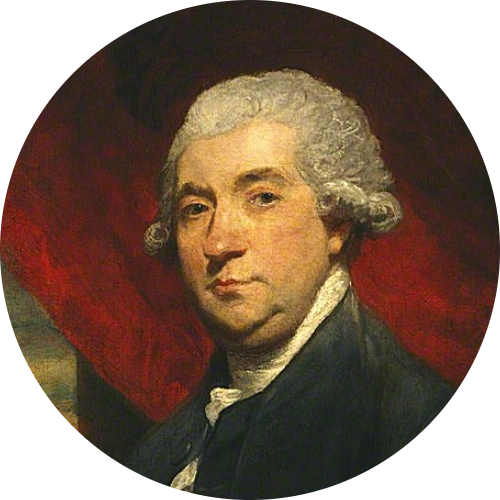English poet and satirist. He went to school with Robert Lloyd and William Cowley at Westminister School. In 1756 he became curate of South Cadbury, but in 1761, following a divorce, he moved to London where he began his literary career. He met John Wilkes whom he joined in writing the critical periodical The North Briton, for which Wilkes was temporarily imprisoned in 1763.
He was a lifelong friend of Robert Lloyd, who, apparently, died following the news of Churchill's death. Churchill's sister was engaged to Lloyd and died soon afterwards.
Charles Churchill's poems were published, for the most part, by William Flexney. In one of them, the Ghost, Dr Johnson features prominently as Pomposo of whom the poem tells us that "He for subscribers baits his hook - and takes your cash, but where's the book?", which was an allusion to Johnson's long overdue edition of Shakespeare. Johnson on his part said about Churchill (to Boswell and Goldsmith) that "I have a better opinion of him now than I had at first, as he has shown more fertility than I expected. To be sure, he is a tree that cannot produce true fruit. He only bears crabs. But, Sir, a tree that produces a great many crabs is better than one which produces only a few crabs." 1
According to Irène Simon (writing in 1959), "Churchill's reputation has had a strange course: he was highly eulogized and attacked bitterly in his own day, and in our own he has been variously acclaimed as a forerunner of the romantic revival and praised for his neo-classical virtues."2
Boswell had seen Churchill a few times (at Lord Eglinton's in November 1762 and at Westminister School in December 1762), but apparently was not actually introduced to him until they met at Bonnell Thornton's on May 24, 1763. Boswell was a frequent reader of The North Briton, and he admired the group of people associated with Wilkes and Churchill (i.e. Thornton, Robert Lloyd and William Cowper). Churchill and Boswell sat next to each other at a theatre performance on June 20, 1763, to Boswell's great joy ("I was vain to be seen talking with that great bard", he wrote in his journal afterwards).
Twenty years after Churchill's death, Boswell mentioned him in his Journal of a Tour to the Hebrides (1784), as on August 17, 1773, Boswell and Johnson had discussed the legal aspects of literary property and taxes:
I mentioned an argument of mine: that literary performances are not taxed. As Churchill says, ‘No statesman yet has thought it worth his pains / To tax our labours, or excise our brains’, and therefore they are not property. “Yet,” said [Johnson], “we hang a man for stealing a horse, and horses are not taxed.”
From Amazon.co.uk
- The Nonsense Club: Literature and Popular Culture, 1749-64
- Poetical Works
- Selected Poems of Thomas Gray, Charles Churchill and William Cowper.
It is often possible to find various writings by Charles Churchill at the AbeBooks used books search engine. Among them are The Correspondence of John Wilkes and Charles Churchill and The Poetical Works of Charles Churchill.
